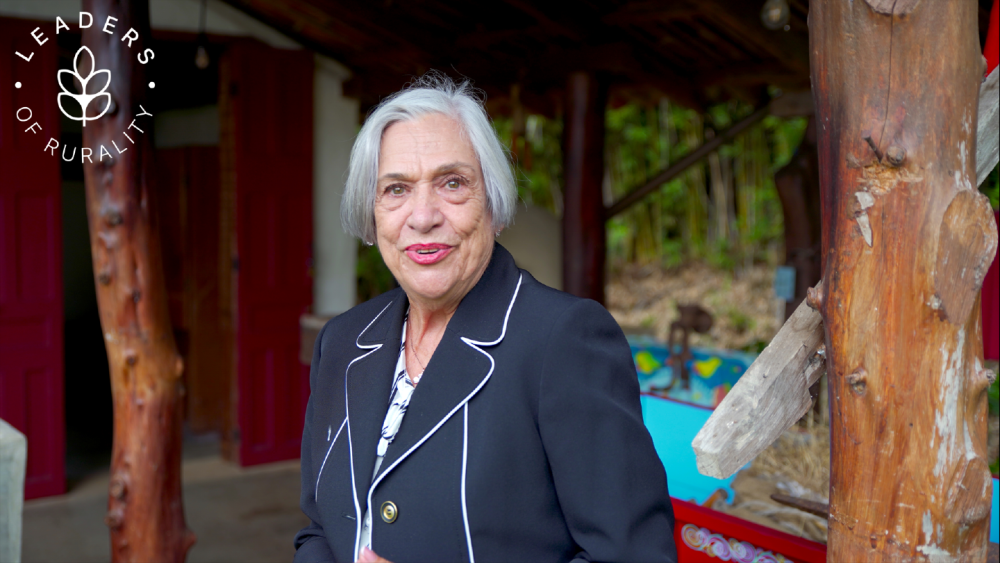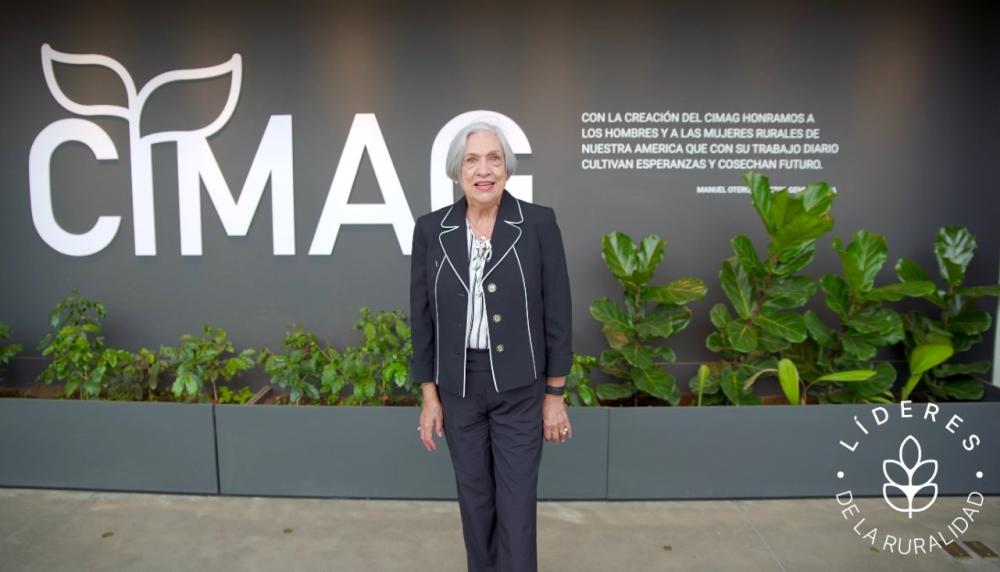Murillo will receive the “Soul of Rurality” award, an initiative by the agency specialized in agricultural and rural development to pay tribute to men and women who are leaving their mark and making a difference in the rural communities of the Americas, a key region for food and nutrition security and the environmental sustainability of the planet.

San Jose, 23 May 2022 (IICA) – Sonia Murillo, a sugarcane farmer from Costa Rica, promoter of fair trade in Latin America and the Caribbean, and creator of development opportunities for smallholders, was recognized as a “Leader of Rurality” in the Americas by the Inter-American Institute for Cooperation on Agriculture (IICA).
In recognition, Murillo will receive the “Soul of Rurality” award, an initiative by the agency specialized in agricultural and rural development to pay tribute to men and women who are leaving their mark and making a difference in the rural communities of the Americas, a key region for food and nutrition security and the environmental sustainability of the planet.
Sonia Murillo is a member of Coopecañera R.L., a cooperative of small-scale producers in the canton of San Ramón, in Costa Rica’s Central Valley. After becoming affiliated with the Latin American and Caribbean Network of Fair-Trade Small Producers and Workers (CLAC), she was one of the founders of the Network for Costa Rica and Panama.
The concept of fair trade focuses not only on the price farmers receive for their merchandise, but also on the social, economic, and environmental sustainability of production and trade. It aims to dignify the work, show respect for the environment, and promote the responsible, sustainable management of natural resources.
Through fair trade, Sonia strives to engage young people in agriculture and to promote public policies in support of family farmers.
The Leaders of Rurality award recognizes individuals who are playing a critical dual role as guarantors of food and nutrition security and custodians of the planet’s biodiversity, by producing under any condition. The recognition also highlights these individuals’ capacity to serve as role models in the region’s rural areas.
Sonia Murillo, the woman who works to build up small-scale farmers in the region

Born into a family of coffee and sugarcane farmers in San Ramón, Alajuela, in Costa Rica’s Central Valley, Sonia Murillo worked as an educator, but she always felt nostalgic for the fields. This longing, coupled with her calling to help others, led to her reencounter with agriculture and to putting all her efforts and capabilities into ensuring profitability for small-scale farmers as a path to a better quality of life for rural communities.
The family farm where Sonia spent her happy childhood—in constant contact with nature—had a sugarcane press and was only two kilometers from the city. Over the years, while studying Social Science at the University of Costa Rica and later, while working as an educator, Sonia has always made her way back to the farm for the coffee harvest.
Sonia and her siblings inherited the farm and 25 years ago, Sonia decided it was time to devote her life to sugarcane. She joined Coopecañera R.L., an organization founded in 1972 by 115 sugarcane farmers from the canton of San Ramón. Sonia soon joined the cooperative’s board of directors, which today comprises over 200 farmers, most of whom work between two and three hectares of land. This connection to agriculture was what enabled Sonia to join the fair-trade movement.
“Fair trade is a philosophy of life. It is an alternative that seeks higher quality production and better crop yields, while enabling access to a decent standard of living for producers, through payment of a fair price for their efforts. The only way to achieve these goals is for small-scale producers to organize and establish cooperatives or associations, which today are internationally certified for their commitment to fair trade. Through the organization, we have achieved a minimum price and an incentive for certain products, including coffee, cacao, sugarcane, banana, and some other fruits”, explains Sonia.
The Latin American and Caribbean Network of Fair-Trade Small Producers and Workers (CLAC) was established in 2004 and Sonia learned about the organization two years later, when she was sent by Coopecañera to the organization’s regional meeting. In 2008, she joined the Board of Directors of CLAC, whose strategy to strengthen the organization at the time was to establish national coordination units. Thus, Sonia became one of the founders of the Fair-Trade Network in Costa Rica for coffee, banana, sugarcane, pineapple, cacao, and cassava farmers, among others.
“Fourteen of our organizations are fairtrade certified in Costa Rica and two in neighboring Panama, which together have 23,000 small-scale farmer members. We’re always working to help the associations become certified so they can access new markets”, says Sonia.
“There are a million farmers in the region”, she adds. “I believe the fairtrade model is the most complete production model because it focuses not only on the price that is paid, but also on a series of factors that constitute a way of life and a different way of doing things, seeking, above all, social justice not only for the farmer, but for the community as a whole, because agriculture casts a wide net”.
CLAC is part owner of Fairtrade International, which brings together farmers from around the world and represents all Fairtrade certified organizations in Latin America and the Caribbean. This certification is based on ten nonnegotiable principles: create opportunities for economically disadvantaged producers; transparency, democracy and accountability; capacity building; long-term, fair-trade relationships with farmers; payment of a fair price; gender equality; good working conditions, ensuring protection of human and workers’ rights; no child labor; respect for the environment; and information and awareness.
CLAC works to represent and promote the interests, empowerment, and development of its members and communities. Today, it comprises over 1,000 member organizations in 24 countries across North and South America.
When asked about the biggest lesson she has learned over the years, Sonia Murillo doesn’t hesitate: “That association is what strengthens family farmers and what paves the way for success. Costa Rica has had a strong cooperative movement, but unfortunately many have been lost along the way. Perhaps we need more sense of guild community and that is why some didn’t survive. The lesson is that if we want to build a better country, we must look not only to large-scale farmers and exporters, but also to small producers, and recognize that part of democracy is good stewardship of the land. Over 90% of Costa Rican coffee is grown on small farms and this has been very important for the country’s development. It’s essential to seek out the best price for a quality product and to make society aware—it needs to know that behind every pineapple or coffee bean is a farmer who is working hard”.
Sonia has no doubt that family farmers are the true guarantors of food security and the environmental sustainability of production in Costa Rica and across the Americas.
“During the darkest moments of the COVID-19 pandemic”, she recalls, “we saw the proof, because while we were lacking in many things, there was always food on the table. We have small-scale farmers to thank for that—that every day, whether rain or shine, they are caring for their crops. The distribution of land in the hands of small-scale farmers guarantees food security”.
Today, Sonia Murillo works to transmit a love for the land to new generations.
“We need for young people to become interested in conserving the soil,” she concludes, “and that is only possible if we facilitate access to new technologies and a profitable activity. Today, it doesn’t make sense to work the land with a shovel when modern tools exist. It’s important for the government to look to agriculture and to help farmers through public policies so that they can grow”.
More information:
Institutional Communication Division
comunicacicn.institucional@iica.int











